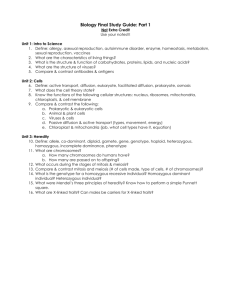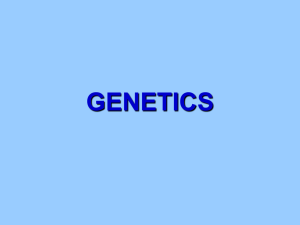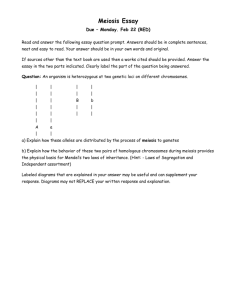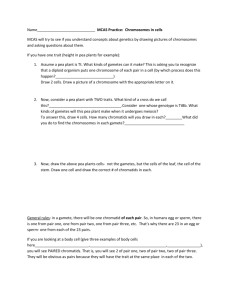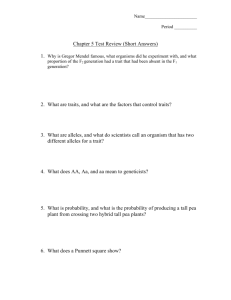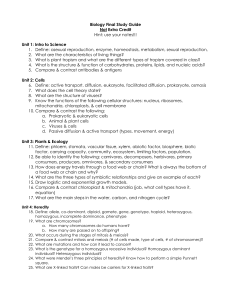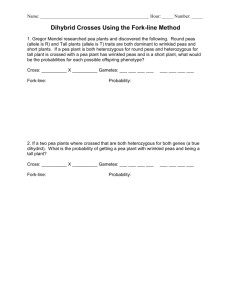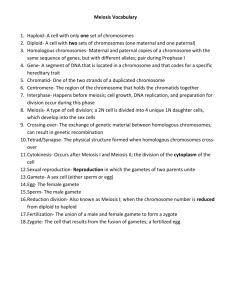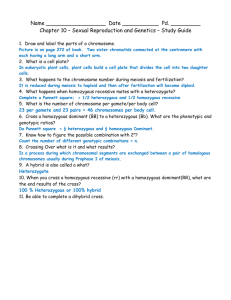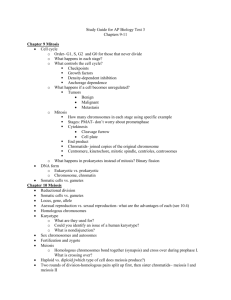Genetic Inheritance PPT
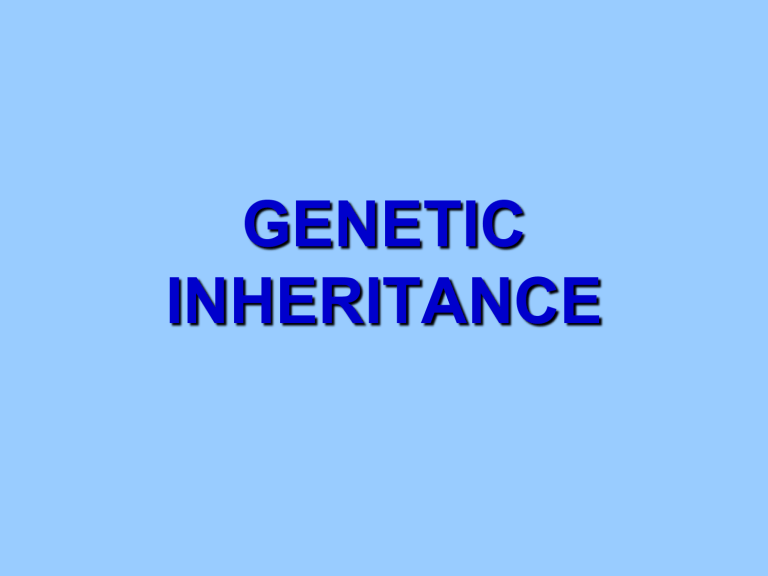
GENETIC
INHERITANCE
Learning Outcomes
At the end of this topic you should be able to
1. Give a definition for a gamete
2. Outline the process gamete formation
3. Give the function of gamete in sexual reproduction
4. Define fertilisation
5. Define allele
6. Differentiate between the terms homozygous and heterozygous
Learning Outcomes (cont.)
At the end of this topic you should be able to
6. Differentiate between genotype and phenotype
7. Differentiate between dominant and recessive
8. Show the inheritance to the F1 generation in a cross involving:
• Homozygous parents
• Heterozygous parents
• Sex determination
• Show the genotypes of parents, gametes and offspring
Sexual Reproduction
• Involves two parents
• Each parent makes reproductive cells
- called gametes
Ovum Producing Cell
Diploid Nucleus
Female
Parent Nucleii
Male
Sperm Producing Cell
Diploid Nucleus
Meiosis
Ovum
Haploid Nucleus
Sperm
Haploid Nucleus
Fertilisation
Zygote – Diploid Nucleus
Outline of Fertilisation
• Gametes join together by fertilisation
• Form a diploid zygote
• This develops into an embryo
• Eventually into a new individual
• New individual resembles both parents
– but is not identical to either
What are Gametes?
• Reproductive Cells
• Formed by meiosis
• Contain single sets of chromosomes
- haploid
• Capable of fusion to form zygote
- diploid
• Zygote contains genetic information of both gametes
Learning Check
1. What are reproductive cells called?
2. Where are they found?
3. Are they haploid or diploid cells?
4. How are they formed?
5. What is a zygote?
Sex Determination
Human Chromosomes
• We have 46 chromosomes, or 23 pairs.
• 44 of them are called autosomes and are numbered 1 through 22. Chromosome 1 is the longest, 22 is the shortest.
• The other 2 chromosomes are the sex chromosomes : the
X chromosome and the Y chromosome.
• Males have and X and a Y; females have 2 X’s: XY vs.
XX.
Male Karyotype
Extracted image from http://www.genome.gov/glossary/resources/karyotype.pdf
Female Karyotype http://www.ucl.ac.uk/~ucbhjow/b200/karyotype.html
Sex Determination
The basic rule:
If the Y chromosome is present, the person is male .
If absent , the person is female .
Meiosis
the X and Y chromosomes separate and go into different sperm cells:
½ the sperm carry the X and the other half carry the Y.
All eggs have one of the mother’s X chromosomes
The Y chromosome has the main sexdetermining gene on it, called SRY
Sex Determination
• About 4 weeks after fertilization, an embryo that contains the SRY gene develops testes, the primary male sex organ.
• The testes secrete the hormone testosterone.
• Testosterone signals the other cells of the embryo to develop in the male pattern.
Learning Check
1. How many pairs of chromosomes does a human somatic cell have?
2. Which pair of chromosomes determines the sex of the offspring?
3. If you are male what does chromosome pair number 23 look like?
4. If you are female what does chromosome pair number 23 look like?
Genetics
• The study of heredity .
• Gregor Mendel (1860’s) discovered the fundamental principles of genetics by breeding garden peas .
•
•
•
•
•
Genetic Terms - Alleles
Alternative forms of genes.
Units that determine heritable traits.
Dominant alleles ( TT tall pea plants ) a. homozygous dominant
Recessive alleles ( tt dwarf pea plants ) a. homozygous recessive
Heterozygous ( Tt tall pea plants )
Phenotype
• Outward appearance
• Physical characteristics
• Examples:
1.
tall pea plant
2.
dwarf pea plant
Genotype
Arrangement of genes that produces the phenotype
Example:
1. tall pea plant
TT = tall (homozygous dominant)
2. dwarf pea plant tt = dwarf (homozygous recessive)
3. tall pea plant
Tt = tall (heterozygous)
Punnett square
A Punnett square is used to show the possible combinations of gametes .
Learning Check
1. What is genetics?
2. What is an allele?
3. What is the difference between phenotype and genotype?
4. What is a punnett square used for?
Breed the P generation
• tall (TT) vs. dwarf (tt) pea plants
T T t t
tall (TT) vs. dwarf (tt) pea plants
T t
Tt t Tt
T
Tt
Tt produces the
F
1 generation
All Tt = tall
(heterozygous tall)
Breed the F
1
generation
• tall (Tt) vs. tall (Tt) pea plants
T t t
T
tall (Tt) vs. tall (Tt) pea plants
T
T
TT t Tt t
Tt tt produces the
F
2 generation
1/4 (25%) = TT
1/2 (50%) = Tt
1/4 (25%) = tt
1:2:1 genotype
3:1 phenotype
Monohybrid Cross
• A breeding experiment that tracks the inheritance of a single trait.
• Mendel’s “principle of segregation” a. pairs of genes separate during gamete formation (meiosis).
b. the fusion of gametes at fertilization pairs genes once again.
Homologous Chromosomes
eye color locus
B = brown eyes eye color locus b = blue eyes
This person would have brown eyes (Bb)
Paternal Maternal
Bb
Meiosis - eye color
B
B
B sperm haploid (n) b b diploid (2n) meiosis II b meiosis I
Monohybrid Cross
• Example :
BB = brown eyes
Bb = brown eyes bb = blue eyes
Cross between two heterozygotes for brown eyes (Bb)
B b male gametes
B
Bb x Bb b female gametes
Monohybrid Cross
Bb x Bb
B
B
BB b Bb b
Bb bb
1/4 = BB - brown eyed
1/2 = Bb - brown eyed
1/4 = bb - blue eyed
1:2:1 genotype
3:1 phenotype
Incomplete Dominance
• F1 hybrids have an appearance somewhat in between the phenotypes of the two parental varieties.
• Example: snapdragons (flower)
• red (RR) x white (rr)
R R
RR = red flower rr = white flower r r
Incomplete Dominance
R r
Rr r Rr
R
Rr
Rr produces the
F
1 generation
All Rr = pink
(heterozygous pink)
Pink Flowers?
Co-dominance
• Two alleles are expressed ( multiple alleles ) in heterozygous individuals .
• Example: blood
1. type A
2. type B
= I A I A or I A i
= I B I B
3. type AB = I A I B or I B i
4. type O = ii
Co-dominance
• Example:
I B homozygous male B (I B I B ) x heterozygous female A (I A i)
I B
I A
I A I B I A I B
1/2 = I A I B
1/2 = I B i i
I B i I B i
Learning Check
1. What is a monohybrid cross?
2. What do the terms homozygous and heterozygous represent?
3. What is the difference between co dominance and incomplete dominance
Practice with Crosses
http://www.zerobio.com/drag_gr11/mono.htm
http://www.brooklyn.cuny.edu/bc/ahp/MGInv/M
GI.Intro.html
Chromosomes and Genetics
Chromosomes are long pieces of DNA, with supporting proteins
Genes are short regions of this DNA that hold the information needed to build and maintain the body
Genes have fixed locations: each gene is in a particular place on a particular chromosome
Diploids have 2 copies of each chromosome, one from each parent. This means 2 copies of each gene.
What have you learned?
Can you …………………….
1. Define a gamete and understand gamete formation
2. Define fertilisation and sex determination
3. Define allele
4. Differentiate between the terms homozygous and heterozygous
5. Differentiate between genotype and phenotype
6. Differentiate between dominant and recessive
7. Understand incomplete dominance
8. Be able to complete monohybrid crosses and state the genotypes and phenotypes of parents and offspring
9. Understand the 3:1 ratio for heterozygous crosses
